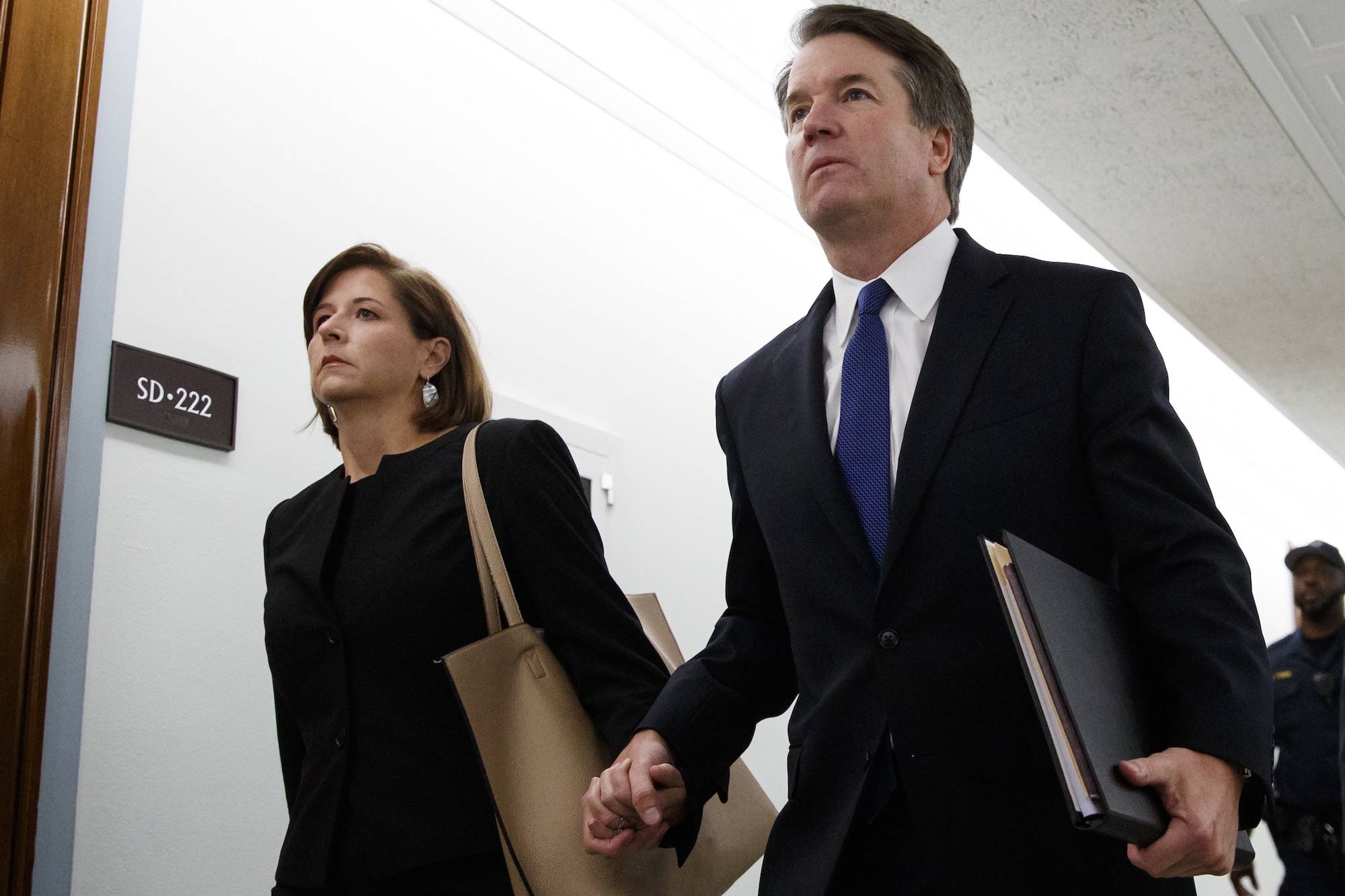A deeply divided Senate pushed Brett Kavanaugh’s Supreme Court nomination past a key procedural hurdle Friday, setting up a likely final showdown on Saturday in a spellbinding battle that’s seen claims of long-ago sexual assault by the nominee threaten President Donald Trump’s effort to tip the court rightward for decades.
The Senate voted 51-49 to limit debate, defeating Democratic efforts to scuttle the nomination with endless delays and moving the chamber toward a climax of a fight that has captivated the country since summer. With Republicans controlling the chamber 51-49, one Republican voted to stop the nomination, one Democrat to send it further.
Of the four lawmakers who had not revealed their decisions until Friday — all moderates — Republican Sens. Susan Collins of Maine and Jeff Flake of Arizona voted yes, as did Democrat Joe Manchin of West Virginia. Republican Lisa Murkowski of Alaska voted not to move the nomination ahead.
While the vote was a victory for the GOP, lawmakers can vote differently on the climactic confirmation roll call, which seems likely Saturday afternoon. Collins told reporters she would announce later Friday how she would go.
That left unclear whether Friday’s tally signalled that the 53-year-old federal appellate judge was on his way to the nation’s highest court, though it would be unusual for lawmakers to switch their votes on such a high-profile issue.
Confirmation would be a crowning achievement for Trump, his conservative base and Senate Majority Leader Mitch McConnell, R-Ky.
Murkowski sat solemnly during the roll call and whispered “No” when it was her turn to vote. As the tally neared an end, she spoke with Collins, a friend. The pair was surrounded by colleagues from both parties after the vote.
All four lawmakers who’d been undeclared said little or nothing to reporters as they left the chamber.
Trump weighed in shortly after the roll call was announced, tweeting, “Very proud of the U.S. Senate for voting ‘YES’ to advance the nomination of Judge Brett Kavanaugh!”
Vice-President Mike Pence, who could have broken a 50-50 tie, watched the vote from the White House. He is heading to New York for a congressional fundraiser Friday but planned to be back in Washington for the final vote.
Friday’s procedural vote occurred a day after the Senate received a roughly 50-page FBI report on the sexual assault allegations, which Trump ordered only after wavering GOP senators forced him to do so.
Republicans said the secret document — which described interviews agents conducted with 10 witnesses — failed to find anyone who could corroborate allegations by his two chief accusers, Christine Blasey Ford and Deborah Ramirez. Democrats belittled the bureau’s findings, saying agents constrained by the White House hadn’t reached out to numerous other people with potentially important information.
The vote occurred against a backdrop of smouldering resentment by partisans on both sides. That fury was reflected openly by thousands of boisterous anti-Kavanaugh demonstrators who bounced around the Capitol complex for days, confronting senators in office buildings and even reportedly near their homes.
On the Senate floor, lawmakers’ comments underscored the lingering bitterness.
“What left wing groups and their Democratic allies have done to Judge Kavanaugh is nothing short of monstrous,” Senate Judiciary Committee Chairman Chuck Grassley, R-Iowa, said on the chamber’s floor before the vote. He accused Democrats of using destructive, unwarranted personal attacks on the nominee and even encouraging the protesters, saying, “They have encouraged mob rule.”
Dianne Feinstein of California, that committee’s top Democrat, said Kavanaugh’s testimony at last week’s dramatic Judiciary panel hearing should “worry us all,” citing “a hostility and belligerence that is unbecoming” of a Supreme Court nominee.
Senate Minority Leader Chuck Schumer, D-N.Y., called the fight “a sorry epilogue to the brazen theft of Justice Scalia’s seat.” That reflected Democrats’ lasting umbrage over Republicans’ 2016 refusal to even consider Merrick Garland, President Barack Obama’s nominee to replace the late Antonin Scalia.
When Trump nominated Kavanaugh in July, Democrats leapt to oppose him, saying that past statements and opinions showed he’d be a threat to the Roe v. Wade case that assured the right to abortion. They said he also seemed ready to knock down President Barack Obama’s health care law and to rule for Trump if federal authorities probing his 2016 campaign’s connections to Russia initiate legal action.
But that evolved into a late-summer spectacle after Ford accused Kavanaugh of trying to rape her at an alcohol-infused high school gathering in 1982, when both were teenagers. Two other women also emerged and accused him of other incidents of sexual misconduct. Kavanaugh has denied all the charges.
Under pressure from wavering Republicans, GOP leaders agreed to an extraordinary Senate Judiciary Committee hearing last week that mesmerized the nation as Ford nervously recounted her story and said she was “100 per cent” certain that Kavanaugh was her attacker.
A fuming Kavanaugh strode into the same packed hearing room that afternoon and said he, too, was “100 per cent” certain the incident had not occurred. He angrily accused Democrats of a “search and destroy” mission, fueled by their hatred of Trump.
AP reporters Mary Clare Jalonick, Matthew Daly, Padmananda Rama, Kenneth Thomas and Catherine Lucey contributed.
Lisa Mascaro And Alan Fram, The Associated Press



